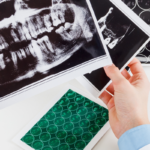CDA Provides Answers to X-ray Policy Changes
9/22/2015-From the CDA
United Concordia changed how periapical X-rays would be paid this summer and CDA Practice Support, after receiving calls from members about the changes, reached out to the company on behalf of dentists to get additional information.
In its June 23 letter to dentists, United Concordia stated that periapical radiographs (D0220, D0230) taken routinely with a periodic oral evaluation (D0120) will no longer be covered; those taken routinely in the absence of a patient complaint/specific signs and symptoms will be denied; and a participating dentist will not be able to bill the member. However, those taken as the result of specific signs and/or symptoms that are supported by the U.S. Food and Drug Administration guidelines for prescribing radiographs will be allowed. United Concordia stated that its policy on periapical X-rays was being changed to conform to federal guidelines to reduce patients’ exposure to radiation.
CDA has fielded many calls from members about this change. As a result, CDA reached out to United Concordia. Below are the aspects of the new policy that CDA has learned from its correspondence with the insurance company:
- This policy only affects individual periapical radiographs that are taken in conjunction with a periodic oral evaluation. (Per FDA guidelines, taking periapical X-rays during a periodic oral examination should be based on the need of the individual patient, not as a routine part of a radiographic assessment.)
- Periapical x-rays are still covered, but the rationale for taking the X-rays has changed. The change is that rationale must now be provided for why the periapical radiographs were taken with the oral evaluation. That is, what are the signs and symptoms that justify the radiographs? United Concordia also wants to see the radiograph to validate the description of the clinical situation. Example: If the dentist indicates that the patient has a strange, bony lesion that is being followed, it would be expected that the bony lesion be on the periapical X-ray.
- This policy does not affect periapical radiographs taken with any other type of oral evaluation or for periapical radiographs taken as part of a full-mouth series of radiographs. As such, there should be no reason why identification of otherwise unknown conditions in teeth or in bone (i.e., in the absence of any signs or symptoms) through routine, patient-specific screenings should still occur. The FDA recommendations for prescribing dental radiographs provides guidance as to how often these types of radiographic screenings should be provided, based on the individual condition of each patient.
- Situations where a previous X-ray or X-rays, such as a full-mouth series of radiographs, has identified something with the patient’s oral health condition that requires monitoring, a periapical X-ray or X-rays at a periodic evaluation visit may be appropriate. Things like strange bone anatomy, odd periapical appearance of a tooth, history of large or deep restorations, suspicious or concerning previous root canal therapy, patient symptoms indicating a possible underlying problem, the finding of a large carious lesion or a fracture upon periodic bitewing radiographs or upon intraoral evaluation, monitoring transition to adult dentition, etc., are all good reasons to take a periapical X-ray of that area to either investigate the findings or to follow the condition to see if it changes over time. The taking of routine periapical radiographs of the anterior region or other regions in a patient that has no symptoms, no signs and no evidence of previous anatomical concerns in the past has no basis and overexposes patients to unnecessary radiation.
Per FDA guidelines, taking periapical X-rays during a periodic oral evaluation should be diagnosed based on need by patient, not as a standard baseline of X-rays for every patient. To review the FDA’s guidelines on X-rays, which were developed in conjunction with the ADA, visit fda.gov.
To speak to CDA Practice Support about these changes call 800.232.7645.






0 Comments